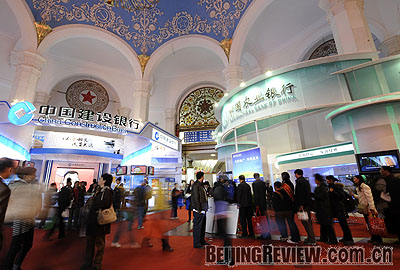|
|
 REAL DEMAND: One lesson that China has learned from the U.S. financial crisis is that all financial institutions have to develop services and products based on the demands of the real economy (DAI XUMING)
REAL DEMAND: One lesson that China has learned from the U.S. financial crisis is that all financial institutions have to develop services and products based on the demands of the real economy (DAI XUMING) |
The subprime crisis that originated in the United States has prompted a global economic slowdown. In an interview with China Securities Journal, Li Yang, Director of the Institute of Finance and Banking under the Chinese Academy of Social Sciences, reflected on the lessons and opportunities the crisis provides for China's financial product innovation and development strategies.
During the interview, Li advocated that financial innovations in China should serve the real economy, and the government should give equal importance to the development of the capital market and financial agents while improving the country's financial system. He said the financial crisis in the United States has renewed the idea of establishing a new international monetary system, and he himself supports a fixed exchange rate system. He said China could not avoid buying U.S. treasuries as long as the country is still in possession of huge foreign exchange reserves.
Financial derivatives
Li said the cause of the U.S. financial crisis was that the government and companies had relied on the excessive leverage of financial institutions for consumption and production. Of all the lessons China should learn from the crisis, the primary one should be to always let financial reforms and innovations serve the real economy.
He said the Chinese Government should bear in mind the principle of serving companies, citizens and the real economy in promoting financial reform. It also should require that derivative products not be developed if they could disrupt the market.
The financial economy tends to be alienated from the real economy in China. The bond market serves mainly financial institutions, and observers question whether it has been rational for many non-banking institutions here to seek initial public offerings one after another. These institutions, subject to fluctuations in the capital market, have blurred the line between their major and supplementary businesses and thus caused a string of problems, Li said. The non-deliverable forward (NDF) market is a case in point. The exchange rate fluctuations in the renminbi NDF market have increasingly been alienated from China's real economic performance, although they have still created strong market expectations for renminbi appreciation, he said.
Li suggested that financial institutions also beef up their risk management and shun risks by not issuing loans that have failed to meet related requirements. They should establish a complete and strict internal control system of losses and set apart an adequate capital cushion against risks.
Huge market potential
The U.S. financial turmoil has prompted China to reconsider the relationship between direct and indirect financing. Financial agents and the capital market as a whole meet different demands during economic development, and neither of the two is inferior to the other, Li said.
China is undergoing an important phase of transition by relying on a booming hi-tech industry for industrial upgrading, and as a result, it has been a pressing job for the country to develop the capital market, he said. As a developing country, China has mainly bought hi-tech industrialization achievements from developed countries, although it still needs support form financial agents in making use of it.
| 